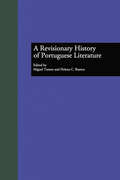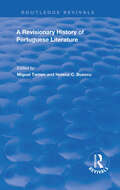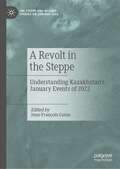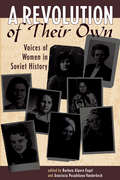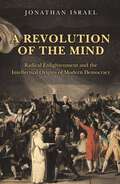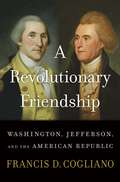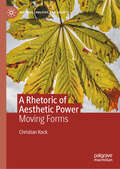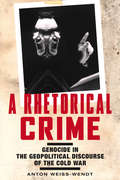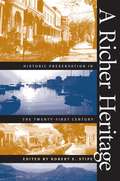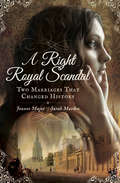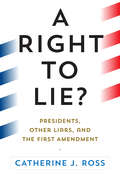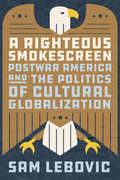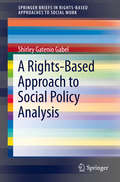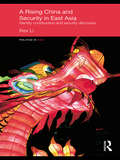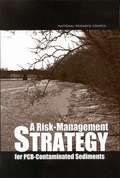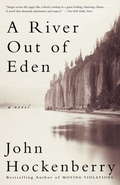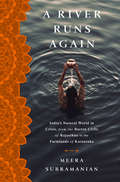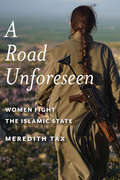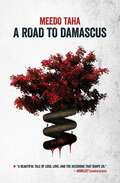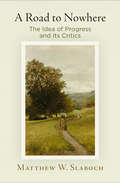- Table View
- List View
A Review of the Fiscal Impulse Measure
by Peter S. Heller Richard D. Haas Ahsan S. MansurThis study was prepared jointly by the Fiscal Affairs and Research Departments of the International Monetary Fund. Since the study was made in preparation for the World Economic Outlook exercise of April 1984, all estimates reflect data and analyses as of the end of February 1984.
A Revisionary History of Portuguese Literature (Hispanic Issues #18)
by Miguel Tamen Helena C. BuescuFirst published in 1999. Routledge is an imprint of Taylor & Francis, an informa company.
A Revisionary History of Portuguese Literature (Hispanic Issues Ser.)
by Miguel Tamen Helena C. BuescuFirst published in 1999, this volume is a collection of papers on Portuguese literature, giving a historical and more updated review. Included are twelve essays presented in chronological order, providing students with a series of assessments and developments.
A Revolt in the Steppe: Understanding Kazakhstan’s January Events of 2022 (The Steppe and Beyond: Studies on Central Asia)
by Jean-François CaronThis book explores the various ramifications and consequences of the violent civil protests that affected Kazakhstan in January 2022. In this compelling study, the authors examine the underlying social and political tensions that have affected this biggest country of Central Asia, especially since its political transition of 2019 and how the state has managed to justify its actions that led to a return to peace. It also puts in perspective this event in the wider transition affecting Eurasia with the war in Ukraine and how this shift of world politics may impact Kazakhstan that required the support of Russia and the other members of the Collective Security Treaty Organization during these protests. This book will be of value for scholars, journalists and NGOs working on authoritarianism and on Central Asia.
A Revolution Of Their Own: Voices Of Women In Soviet History
by Barbara EngelThe stories of these eight Russian women offer an extremely rare perspective into personal life in the Soviet era. Some were from the poor peasantry and working class, groups in whose name the revolution was carried out and who sometimes gained unprecedented opportunities after the revolution. Others, born to "misfortune" as the daughters of nobles
A Revolution of the Mind: Radical Enlightenment and the Intellectual Origins of Modern Democracy
by Jonathan IsraelA leading historian reveals the radical origins of humanity's most cherished secular valuesDemocracy, free thought and expression, religious tolerance, individual liberty, political self-determination of peoples, sexual and racial equality—these values have firmly entered the mainstream in the decades since they were enshrined in the 1948 U.N. Declaration of Human Rights. But if these ideals no longer seem radical today, their origin was very radical indeed—far more so than most historians have been willing to recognize. In A Revolution of the Mind, Jonathan Israel, one of the world's leading historians of the Enlightenment, traces the philosophical roots of these ideas to what were the least respectable strata of Enlightenment thought—what he calls the Radical Enlightenment.Originating as a clandestine movement of ideas that was almost entirely hidden from public view during its earliest phase, the Radical Enlightenment matured in opposition to the moderate mainstream Enlightenment dominant in Europe and America in the eighteenth century. During the revolutionary decades of the 1770s, 1780s, and 1790s, the Radical Enlightenment burst into the open, only to provoke a long and bitter backlash. A Revolution of the Mind shows that this vigorous opposition was mainly due to the powerful impulses in society to defend the principles of monarchy, aristocracy, empire, and racial hierarchy—principles linked to the upholding of censorship, church authority, social inequality, racial segregation, religious discrimination, and far-reaching privilege for ruling groups.In telling this fascinating history, A Revolution of the Mind reveals the surprising origin of our most cherished values—and helps explain why in certain circles they are frequently disapproved of and attacked even today.
A Revolutionary Friendship: Washington, Jefferson, and the American Republic
by Francis D. CoglianoThe first full account of the relationship between George Washington and Thomas Jefferson, countering the legend of their enmity while drawing vital historical lessons from the differences that arose between them.Martha Washington’s worst memory was the death of her husband. Her second worst was Thomas Jefferson’s awkward visit to pay his respects subsequently. Indeed, by the time George Washington had died in 1799, the two founders were estranged. But that estrangement has obscured the fact that for most of their thirty-year acquaintance they enjoyed a productive relationship. Precisely because they shared so much, their disagreements have something important to teach us.In constitutional design, for instance: Whereas Washington believed in the rule of traditional elites like the Virginia gentry, Jefferson preferred what we would call a meritocratic approach, by which elites would be elected on the basis of education and skills. And while Washington emphasized a need for strong central government, Jefferson favored diffusion of power across the states. Still, as Francis Cogliano argues, common convictions equally defined their relationship: a passion for American independence and republican government, as well as a commitment to westward expansion and the power of commerce. They also both evolved a skeptical view of slavery, eventually growing to question the institution, even as they took only limited steps to abolish it.What remains fascinating is that the differences between the two statesmen mirrored key political fissures of the early United States, as the unity of revolutionary zeal gave way to competing visions for the new nation. A Revolutionary Friendship brilliantly captures the dramatic, challenging, and poignant reality that there was no single founding ideal—only compromise between friends and sometime rivals.
A Rhetoric of Aesthetic Power: Moving Forms (Rhetoric, Politics and Society)
by Christian KockThis book offers a theory of those formal properties of art that are apt to afford strong aesthetic experience – a project resembling Aristotle’s in the Poetics, where he analysed structures in tragedies that condition the “peculiar pleasure” of tragedy. However, the book’s scope cuts across all genres of literature and also includes classical music – the formal art par excellence. Drawing on a wide array of recent theoretical work and empirical evidence, the book closely analyses dozens of examples of both art forms. Besides Aristotle, major inspiration comes from two modern master thinkers: the linguist Roman Jakobson, who defined the “poetic function” of language, and the rhetorician Kenneth Burke, who proposed a “psychological” concept of form. Throughout, the book argues for aesthetic experience as an end in itself and a component of quality of life, one to which everyone should have access – rather than just a means to other ends.
A Rhetorical Crime: Genocide in the Geopolitical Discourse of the Cold War (Genocide, Political Violence, Human Rights)
by Anton Weiss-Wendt Douglas Irvin-EricksonThe Genocide Convention was drafted by the United Nations in the late 1940s, as a response to the horrors of the Second World War. But was the Genocide Convention truly effective at achieving its humanitarian aims, or did it merely exacerbate the divisive rhetoric of Cold War geopolitics?A Rhetorical Crime shows how genocide morphed from a legal concept into a political discourse used in propaganda battles between the United States and the Soviet Union. Over the course of the Cold War era, nearly eighty countries were accused of genocide, and yet there were few real-time interventions to stop the atrocities committed by genocidal regimes like the Cambodian Khmer Rouge. Renowned genocide scholar Anton Weiss-Wendt employs a unique comparative approach, analyzing the statements of Soviet and American politicians, historians, and legal scholars in order to deduce why their moral posturing far exceeded their humanitarian action.
A Richer Heritage
by Robert E. StipeSurveying the past, present, and future of historic preservation in America, this book features fifteen essays by some of the most important voices in the field. A Richer Heritage will be an essential, thought-provoking guide for professionals as well as administrators, volunteers, and policy makers involved in preservation efforts.An introduction traces the evolution of historic preservation in America, highlighting the principal ideas and events that have shaped and continue to shape the movement. The book also describes the workings--legal, administrative, and fiscal--of the layered federal, state, and local government partnership put in place by Congress in 1966. Individual chapters explore the preservation of designed and vernacular landscapes, the relationship between historic preservation and the larger environmental and land-trust movements, the role of new private and nonprofit players, racial and ethnic interests in historic preservation, and the preservation of our intangible cultural values. A concluding chapter analyzes the present state of the historic preservation movement and suggests future directions for the field in the twenty-first century. Contributors include preservationists, local-government citizen activists, an architect, landscape architects, environmentalists, an archaeologist, a real-estate developer, historians, a Native American tribal leader, an ethnologist, and lawyers.
A Richer, Brighter Vision for American High Schools
by Nel NoddingsIn today's high schools, education is often reduced to a means of achieving financial security, leading to an overemphasis on quantifiable measures of performance. This approach encourages academically talented students to focus on test scores and rankings rather than intellectual enrichment, and discourages students with non-academic talents from pursuing them. A Richer, Brighter Vision for American High Schools advocates instead a unifying educational aim of producing better adults, which would encompass all aspects of students' lives: intellectual, physical, moral, spiritual, social, vocational, aesthetic, and civic. Nel Noddings offers suggestions to improve high schools by increasing collegiality among students and faculty, enriching curricula with interdisciplinary themes, renewing vocational education programs, addressing parenting and homemaking, and professionalizing the teaching force. This thought-provoking book will act as an important guide for teachers, teacher educators, administrators, and policy makers.
A Rift in Time: Travels with My Ottoman Uncle
by Raja ShehadehThe quest for his great-uncle Najib Nassar, an Ottoman journalist - the details of his life, and the route of his great escape from occupied Palestine - consumed award-winning writer Raja Shehadeh for two years. As he traces Najib's footsteps, he discovers that today it would be impossible to flee the cage that Palestine has become. "A Rift in Time" is a family memoir written in luminescent prose, but it is also a reflection on how Palestine - in particular the disputed Jordan Rift Valley - has been transformed. Most of Palestine's history and that of its people is buried deep in the ground: whole villages have disappeared and names have been erased from the map. Yet by seeing the bigger picture of the landscape and the unending struggle for freedom as Shehadeh does, it is still possible to look towards a better future, free from Israeli or Ottoman oppression.
A Right Royal Scandal: Two Marriages That Changed History
by Joanne Major Sarah MurdenFrom the authors of An Infamous Mistress: &“The tale of two juicy 19th-century scandals, both concerning the aristocratic Cavendish-Bentinck family&” (Cheshire Life). Almost two books in one, A Right Royal Scandal recounts the fascinating history of the irregular love matches contracted by two successive generations of the Cavendish-Bentinck family, ancestors of the British royal family. The first part of this intriguing book looks at the scandal that erupted in Regency London, just months after the Battle of Waterloo, when the widowed Lord Charles Bentinck eloped with the Duke of Wellington&’s married niece. Over two decades later and while at Oxford University, Lord Charles&’ eldest son fell in love with a beautiful Romany girl, and secretly married her. When his alliance was discovered, he was cast adrift by his family—with devastating consequences. A love story as well as a brilliantly researched historical biography, this is a continuation of Joanne Major and Sarah Murden&’s first biography, An Infamous Mistress, about the eighteenth-century courtesan Grace Dalrymple Elliott, whose daughter was the first wife of Lord Charles Bentinck. The book ends by showing how, if not for a young gypsy and her tragic life, the British monarchy would look very different today. &“An easy read of a subject that keeps you engrossed from start to finish. This book is brilliant for those who enjoy the scandals of historical television, with the added authenticity of historical fact.&” —History of Royals &“The plots may seem to come straight out of the world of Regency Romance but they are all true, and carefully annotated and verified by Major and Murden.&” —Naomi Clifford, author of The Murder of Mary Ashford
A Right to Lie?: Presidents, Other Liars, and the First Amendment
by Catherine J. RossIn A Right to Lie?, legal scholar Catherine J. Ross addresses the urgent issue of whether the nation's highest officers, including the president, have a right to lie under the Speech Clause, no matter what damage their falsehoods cause. Does freedom of expression protect even factual falsehoods? If so, are lies by candidates and public officials protected? And is there a constitutional path, without violating the First Amendment, to stop a president whose persistent lies endanger our lives and our democracy?Perhaps counter-intuitively, the general answer to each question is "yes." Drawing from dramatic court cases about defamers, proponents of birtherism, braggarts, and office holders, Ross reveals the almost insurmountable constitutional and practical obstacles to legal efforts to rein in public deception. She explains the rules that govern the treatment of lies, while also demonstrating the incalculable damage presidential mendacity may lead to, as revealed in President Trump's lies about the COVID-19 pandemic and the legitimacy of the 2020 election.Falsehoods have been at issue in every presidential impeachment proceeding from Nixon to Trump. But, until now, no one has analyzed why public lies might be impeachable offenses, and whether the First Amendment would provide a defense. Noting that speech by public employees does not receive the same First Amendment protection as the speech of ordinary citizens, Ross proposes the constitutionally viable solution of treating presidents as public employees who work for the people. Charged with oversight of the Executive, Congress may—and should—put future presidents on notice that material lies to the public on substantial matters will be deemed a "high crime and misdemeanor" subject to censure and even impeachment. A Right to Lie? explains how this approach could work if the political will were in place.
A Righteous Smokescreen: Postwar America and the Politics of Cultural Globalization
by Sam LebovicAn examination of how the postwar United States twisted its ideal of “the free flow of information” into a one-sided export of values and a tool with global consequences. When the dust settled after World War II, the United States stood as the world’s unquestionably pre-eminent military and economic power. In the decades that followed, the country exerted its dominant force in less visible but equally powerful ways, too, spreading its trade protocols, its media, and—perhaps most importantly—its alleged values. In A Righteous Smokescreen, Sam Lebovic homes in on one of the most prominent, yet ethereal, of those professed values: the free flow of information. This trope was seen as capturing what was most liberal about America’s self-declared leadership of the free world. But as Lebovic makes clear, even though diplomats and public figures trumpeted the importance of widespread cultural exchange, these transmissions flowed in only one direction: outward from the United States. Though other countries did try to promote their own cultural visions, Lebovic shows that the US moved to marginalize or block those visions outright, highlighting the shallowness of American commitments to multilateral institutions, the depth of its unstated devotion to cultural and economic supremacy, and its surprising hostility to importing foreign cultures. His book uncovers the unexpectedly profound global consequences buried in such ostensibly mundane matters as visa and passport policy, international educational funding, and land purchases for embassies. Even more crucially, A Righteous Smokescreen does nothing less than reveal that globalization was not the inevitable consequence of cultural convergence or the natural outcome of putatively free flows of information—it was always political to its core.
A Righteous Smokescreen: Postwar America and the Politics of Cultural Globalization
by Sam LebovicAn examination of how the postwar United States twisted its ideal of “the free flow of information” into a one-sided export of values and a tool with global consequences. When the dust settled after World War II, the United States stood as the world’s unquestionably pre-eminent military and economic power. In the decades that followed, the country exerted its dominant force in less visible but equally powerful ways, too, spreading its trade protocols, its media, and—perhaps most importantly—its alleged values. In A Righteous Smokescreen, Sam Lebovic homes in on one of the most prominent, yet ethereal, of those professed values: the free flow of information. This trope was seen as capturing what was most liberal about America’s self-declared leadership of the free world. But as Lebovic makes clear, even though diplomats and public figures trumpeted the importance of widespread cultural exchange, these transmissions flowed in only one direction: outward from the United States. Though other countries did try to promote their own cultural visions, Lebovic shows that the US moved to marginalize or block those visions outright, highlighting the shallowness of American commitments to multilateral institutions, the depth of its unstated devotion to cultural and economic supremacy, and its surprising hostility to importing foreign cultures. His book uncovers the unexpectedly profound global consequences buried in such ostensibly mundane matters as visa and passport policy, international educational funding, and land purchases for embassies. Even more crucially, A Righteous Smokescreen does nothing less than reveal that globalization was not the inevitable consequence of cultural convergence or the natural outcome of putatively free flows of information—it was always political to its core.
A Rights-Based Approach to Social Policy Analysis (SpringerBriefs in Rights-Based Approaches to Social Work #0)
by Shirley Gatenio GabelThis brief resource sets out a rights-based framework forpolicy analysis that allows social workers to enhance their long-term vision aswell as their current practice. It introduces the emerging P. A. N. E. (Participation, Accountability, Non-discrimination, Equity) model for evaluatingsocial policy, comparing it with the traditional needs-based charity model interms of not only effectiveness and efficiency but also inclusion and justice. Recognizedstandards for human rights are used to identify values crucial to informing policygoals. Exercises, key documents, and an extended example illustrate both the processesof creating empowering social policy and its best and most meaningful outcomes. Included in the coverage: Rights-based and needs-based approaches to social policy analysis. Regional and international human rights instruments. Grounding social policies in legal and institutional frameworks. Conceptualizing social issues from a human rights frame. Measuring progress on the realization of human rights. Rights-based analysis of maternity, paternity, and parental leaves in the United States. For social workers and social work researchers, A Rights-Based Approach to Social Policy Analysisgives readers a modern platform for achieving the highest goals of thefield. It also makes a worthwhile class text for social work programs.
A Rising China and Security in East Asia: Identity Construction and Security Discourse (Politics in Asia)
by Rex LiThis volume provides a comprehensive and in-depth analysis of the security discourse of Chinese policy elites on the major powers in East Asia in relation to China’s self-perception as a rising power. It is the first book-length study that utilizes International Relations theories systematically to analyze Chinese security perceptions of the United States, Japan and Russia, and the debate among Chinese international relations specialists on how China should respond to the perceived challenge from the major powers to its rise to a global status. Rex Li argues that the security discourse of Chinese policy analysts is closely linked to their conception of China’s identity and their desire and endeavour to construct a great power identity for China. Drawing on extensive and up-to-date Chinese-language sources, the study demonstrates that Chinese elites perceive the power, aspirations and security strategies of other East Asian powers primarily in terms of their implications for China’s pursuit of great power status. This new work will contribute significantly to the on-going academic and policy debate on the nature and repercussions of China’s rise. This book will be essential reading for undergraduate and postgraduate students and scholars of Asian security, China’s foreign relations, security studies and international relations.
A Risk-Management STRATEGY for PCB-Contaminated Sediments
by Committee on Remediation of PCB-Contaminated SedimentsThe National Academies Press (NAP)--publisher for the National Academies--publishes more than 200 books a year offering the most authoritative views, definitive information, and groundbreaking recommendations on a wide range of topics in science, engineering, and health. Our books are unique in that they are authored by the nation's leading experts in every scientific field.
A River Out of Eden
by John HockenberryOn a night of torrential rain, a warrior appears near the Colombia River, where the Chinook people thrived before the hydroelectric dams came and changed their entire way of life. He has come to reclaim the river, to return it to its original majesty. Soon after, government employees are found murdered with elaborate harpoons. As the body count grows, Francine Smohalla, a government marine biologist of Chinook and white descent, embarks on her own investigation of the bizarre murders. As she desperately tries to find the killer and prevent any other murders, she finds herself spinning in the convergence of ethnic hatreds between Indians and whites, an unlikely relationship with a kindred spirit whose troubled life has led him to contemplate terrorism and apocalypse, an ancient prophecy about the return of her beloved salmon, and the giant dams on the Columbia that loom large and as seemingly immovable as the mountains themselves. A River Out of Eden is a gripping literary thriller straight from today's headlines set against the uniquely American contradictions of the Pacific Northwest.
A River Runs Again: India's Natural World in Crisis, from the Barren Cliffs of Rajasthan to the Farmlands of Karnataka
by Meera SubramanianCrowded, hot, subject to violent swings in climate, with a government unable or unwilling to face the most vital challenges, the rich and poor increasingly living in worlds a∂ for most of the world, this picture is of a possible future. For India, it is the very real present. In this lyrical exploration of life, loss, and survival, Meera Subramanian travels in search of the ordinary people and microenterprises determined to revive India’s ravaged natural world: an engineer-turned-farmer brings organic food to Indian plates; villagers resuscitate a river run dry; cook stove designers persist on the quest for a smokeless fire; biologists bring vultures back from the brink of extinction; and in Bihar, one of India’s most impoverished states, a bold young woman teaches adolescents the fundamentals of sexual health. While investigating these five environmental challenges, Subramanian discovers the stories that renew hope for a nation with the potential to lead India and the planet into a sustainable and prosperous future.
A River Town
by Thomas KeneallyThe authos of the Booker Prize-winning, bestselling Schindler's List presents a novel about social justice and the inability of humans to hide from their own original sins--no matter how far they run. When Tim Shea leaves his native Ireland for Australia, he thinks he has escaped the prejudices and class structures for good. But it's only a matter of time before he realizes that his adopted country is no more free of intolerance that Great Britain.
A Road Unforeseen: Women Fight the Islamic State
by Meredith Tax"This is the book I've been waiting for-only it's richer, deeper, and more intriguing than I could have imagined. A Road Unforeseen is a major contribution to our understanding of feminism and Islam, of women and the world, and gives me fresh hope for change." -Barbara Ehrenreich, author of Nickel and Dimed and Living With a Wild GodIn war-torn northern Syria, a democratic society-based on secularism, ethnic inclusiveness, and gender equality-has won significant victories against the Islamic State, or Daesh, with women on the front lines as fierce warriors and leaders.A Road Unforeseen recounts the dramatic, underreported history of the Rojava Kurds, whose all-women militia was instrumental in the perilous mountaintop rescue of tens of thousands of civilians besieged in Iraq. Up to that point, the Islamic State had seemed invincible. Yet these women helped vanquish them, bringing the first half of the refugees to safety within twenty-four hours.Who are the revolutionary women of Rojava and what lessons can we learn from their heroic story? How does their political philosophy differ from that of Iraqi Kurdistan, the Islamic State, and Turkey? And will the politics of the twenty-first century be shaped by the opposition between these political models?Meredith Tax is a writer and political activist. Author, most recently, of Double Bind: The Muslim Right, the Anglo-American Left, and Universal Human Rights, she was founding president of Women's WORLD, a global free speech network of feminist writers, and cofounder of the PEN American Center's Women's Committee and the International PEN Women Writers' Committee. She is currently international board chair of the Centre for Secular Space and lives in New York.
A Road to Damascus
by Meedo TahaA CINEMATIC DEBUT OF A PROMISING YOUNG NOVELIST FROM LEBANON--A FAUX-THRILLER ABOUT A RECLUSIVE BOTANIST WHO WITNESSES A POLITICAL MURDER AND IS DRAWN INTO A PERSONAL INVESTIGATION--A captivating thriller that reveals a family&’s intergenerational secrets, a nation&’s deepest fears, and an underground world of politics, religion, and society. Beirut at dawn. A bus leaves the Charles Helou station en route to Damascus. Seven passengers are on board, one of whom is a prominent Lebanese politician. Before crossing the border, the bus is accosted and derailed. All seven passengers are gunned down. A botanist studying a rare occurrence of acacias nearby witnesses the horror. While the nation around him plunges into conspiracy theories and chaos, the botanist realizes he holds the only clue to the mystery: his injured Acacia. This sends him on a quest for answers, through a minefield of national fears and family secrets, deep into a private underworld.
A Road to Nowhere: The Idea of Progress and Its Critics
by Matthew W. SlabochSince the Enlightenment, the idea of progress has spanned right- and left-wing politics, secular and spiritual philosophy, and most every school of art or culture. The belief that humans are capable of making lasting improvements—intellectual, scientific, material, moral, and cultural—continues to be a commonplace of our age. However, events of the preceding century, including but not limited to two world wars, conflicts in Korea and Vietnam, the spread of communism across Eastern Europe and parts of Asia, violent nationalism in the Balkans, and genocides in Cambodia and Rwanda, have called into question this faith in the continued advancement of humankind.In A Road to Nowhere, Matthew W. Slaboch argues that political theorists should entertain the possibility that long-term, continued progress may be more fiction than reality. He examines the work of German philosophers Arthur Schopenhauer and Oswald Spengler, Russian novelists Leo Tolstoy and Aleksandr Solzhenitsyn, and American historians Henry Adams and Christopher Lasch—rare skeptics of the idea of progress who have much to engage political theory, a field dominated by historical optimists. Looking at the figures of Schopenhauer, Tolstoy, and Adams, Slaboch considers the ways in which they defined progress and their reasons for doubting that their cultures, or the world, were progressing. He compares Germany, Russia, and the United States to illustrate how these nineteenth-century critics of the idea of progress contributed to or helped forestall the emergence of forms of government that came to be associated with each country: fascism, communism, and democratic capitalism, respectively.Turning to Spengler, Solzhenitsyn, and Lasch, Slaboch explores the contemporary relevance of the critique of progress and the arguments for and against political engagement in the face of uncertain improvement, one-way inevitable decline, or unending cycles of advancement and decay. A Road to Nowhere concludes that these notable naysayers were not mere defeatists and presents their varied prescriptions for individual and social action.

